#the valarindi
Text

Little Prince
Day 1 for @manweweek
Prompts: Family | Breath & Air
Pairing: BoLT version of Manwë/Varda with baby Fionwë Úrion (Eönwë)
Themes: Soft
Warnings: None
Wordcount: 500+ words
Summary: Baby Fionwë is taken outside for the first time so the others could see him.
This is also available on AO3

A deep but welcomed hush settled within the lofty halls and vast chambers of Ilmarin. Heralds went forth to the furthest corners of the Almaren and beyond, carrying with them the words of their lord and lady to all who wished to hear them.
“Perfect in every way. And already strong,” Manwë declared heartily, cradling the still-amorphous spirit of his firstborn in his arms. His eyes filled with awe when his son stirred, alert and curious. “And I wager it would not be long before he could weave an earthly vessel for himself.”
His queen came to him, her star-speckled skin already holding a glow of renewed vitality. Varda found unspeakable joy in light for as long as she could remember, and the orbs that burned bright in the sky were once her greatest creation. Then she and her lord husband came together and created a new life—a little prince that would be their joy. The very notion of it was enough to leave her humbled and overawed.
“Little Fionwë,” she lilted, smiling when their son reached up and caressed her cheek. Warmth radiated from his touch, as did love. Varda believed he was smiling at her. “As brilliant as the stars and destined for great things, I can feel it in the very depths of my spirit. Come, my lord. It is time our child saw something of the world we all fashioned with our song.”
Her king agreed, following her onto a balcony open to the sky. Fionwë took his first breath of cool mountain air and laughed. It echoed sweetly across the still, star-filled night. Vivid, sparkling orbs of golden light—a visible sign of his delight—burst to life all around him when he laughed, floating in the air like great puffy heads of dandelions gone to seed. Then music flowed forth from all over Almaren and the Timeless Halls, all harps and lutes and viols, filling the star-filled night like Fionwë's laughter did before. The others of their kind sang to welcome the little prince, their voices arising as one and joining the music in a sound of interwoven melodies of indescribable beauty and harmony, and glory that filled the heavens and the earth to overflowing, and the echo of that music caused the very stars themselves to burn brighter, their light increasing and increasing until it seemed like a million brilliant lamps flickered against a never-ending field of indigo and violet and lilac.
“Eru is pleased, my darling. And so are the others," the king remarked while the music of the others went on, filling him with great joy. "Our son has been blessed.”
“Indeed. Now we must go back in,” said Varda, “and prepare ourselves to receive the others.”
They returned to their chambers, and Fionwë began to fuss. He could not understand why they could not tarry a little longer. He wanted to see more of the stars and hear more of the others singing. And since he could not still form proper words, he made his displeasure known in another way, with short, breathy grunts and the tightening of little fists that had already begun to take form. Light burst into life again; this time, it showed itself as orbs of dark red.
“I think we have a warrior in this one,” his father observed, laughing.
“We do indeed,” the queen replied indulgently. “Be patient, little one, and do not fret. Your father and I will take you out again.”

tags@asianbutnotjapanese @batsyforyou
#manweweek#manwe week#Manwë#Varda#Eönwë#book of lost tales#fanfiction#ficlet#the valar#the ainur#the valarindi#a world of whimsy writes
23 notes
·
View notes
Note
dark romance prompt request - attention ~ Telimektar X Ingil
AN: Thanks for your message! This pairing gave me a lot to think about and some worldbuilding ideas which I always appreciate ^^
dark romance prompts
♡ prompt: attention | Telimektar x Ingil
♡ synopsis: Ingil wants attention, and Telimektar wants Ingil. A plan is hatched...
♡ warnings: bathing together, innuendo, naked touching
♡ short oneshot (~750 words)
Quick side note: For those who don't know, both Telimektar and Ingil are from Lost Tales and I decided to transplant them into Silmarillion canon. Since the Valarindi no longer exist, Telimektar is now a Maia of Tulkas and Ingil is one of Ingwë's kids (but not the same person as Ingwion because I wasn't entirely sure if it was intended that way and also preferred the idea of having them be brothers).

It was hard to stand out among the children of High King Ingwë, even as a prince.
Ingil toyed with the ornate golden clasp holding his robes together. For years now he had watched those around him be admired and beloved even by the Ainur – his father being Lord Manwë's favourite, his older brother Ingwion training together with Eönwë and Prince Arafinwë, Lord Tulkas spending time with Prince Maitimo. It had awakened a strange craving for attention within him, and if he was lucky, his wish was finally going to come true.
Telimektar, a Maia of Tulkas, had been eyeing him every time he came to the mansion of the Vala for his own training, and Ingil had begun to take great pleasure in it. Arriving in deliberately provocative outfits – short and thin robes with barely anything underneath – he had made a show out of wrestling with others in underwear and washing himself afterwards. Each and every covetous glance had excited him, yet none as much as the Maia's.
He wanted to be seen. He wanted to be admired. He wanted to be wanted.
And he had soon hatched a plan to tempt Telimektar.
It was late for the day, and the others had already finished training. Ingil was the only one left in the courtyard, as had been his intention, and sauntered over to the baths Tulkas let his guests use once he was certain that he would be alone inside.
He left the door open; just a small gap, but still an undeniable invitation.
The skin of his neck tingled when he walked towards the nearest pool. It was the primal, unmistakable sensation of being watched, and Ingil loved it. His fingers trembled with giddy delight when he unclasped his robes and let them fall to the floor, a pool of white fabric around his feet; his shorts soon met the same fate.
Ingil didn't have to wait long. Before he could even dip his toes into the water, he felt something large, strong and undeniably solid appear directly behind him and a pair of arms wrapped around his naked waist. He leaned against the welcome intruder and looked up to see none other than Telimektar. His bronze skin was flushed and sweaty, strands of white hair clung to his forehead and his amber eyes were dark with lust.
"My prince..."
Emboldened, Ingil pressed his backside against his crotch.
"You wish to speak to me alone?" he asked with feigned innocence.
"I... in a way, yes..."
They were both impatient, Ingil could sense it, yet Telimektar, much like his master, was a being of honour who would not take advantage of a fellow warrior. Deciding to test his resolve, he slipped out of the Maia's embrace after his little stunt, stepped closer to the pool and bent over to pick up a bar of soap.
"Well met then, my friend. I was just about to bathe after today's training – oh, I must be so filthy – so why don't you join me?"
Ingil glanced over his shoulder with a playful, impish grin.
Telimektar had to swallow hard. Maia or not, his form was betraying him.
"I would love to."
"Wonderful." Soap in hand, Ingil entered the pool and turned to face him.
It was all the encouragement Telimektar needed, swiftly freeing himself from his own clothing and following suit. His cock was already hardening, yet his royal companion pretended not to see it.
Ingil was going to make the most out of this.
"I feel so sore," he lamented, "Could you help me?"
"You want me to..."
In lieu of an answer, he held out the soap for him to take. "Yes, please."
His smile was radiant, practised over years at his father's court.
With a drawn out, pleased sigh, Ingil let himself be taken into the Maia's arms once more and enjoyed the sensation of large, strong hands exploring and caressing his entire body while carefully lathering him with soap. He was being handled like a precious gem, a thought that awakened his own arousal, and he felt a blinding sense of triumph and satisfaction. Finally he too received the favour of one of the Ainur and was treated with respect to boot; he was no plaything, no lesser being vying for attention, but a prince receiving the treatment appropriate for his station.
The prospect of bedding Telimektar was tempting – and he certainly deserved at least a kiss for showering him with the attention he so craved. But that was a matter for a different time. For now, Ingil merely leaned back and enjoyed himself.

Thanks for reading!
taglist: @a-world-of-whimsy-5 @eunoiaastralwings @i-did-not-mean-to @singleteapot @wandererindreams
#ingil#telimektar#telimektar x ingil#silmarillion#book of lost tales#silm fanfic#silmarillion fanfiction#book of lost tales fanfic#cílil writes#my writing#dark romance prompts#request
13 notes
·
View notes
Text
Why Do We Know Sauron's Original Name in Quenya if Sauron Was Never In Valinor: Speculations on my Favorite Baddie, Part 3
Finishing up that meta I've been working on for, like, 7 years (RIP me) about Sauron and his original name and the mindf#@& that gave me. Planning to post that on Sun [now posted and can be found here]. But this bit is just too long to fit in it.
In Helge Fauskanger's "A Name for the Dark Lord" (where I first read about "Mairon" in 2015) he points out that Sauron's original name existing in Quenya is pretty odd. The version of Sauron Tolkien was writing about at that time had defected to Melkor's service before the language "Quenya" even existed, so why would his original name be recorded in it?
Now, there's the (I think, likely) Primary World reason for that: Tolkien is writing this down as a part of his work on the "words and phrases" lists he began compiling after the publication of The Lord of the Rings. These words and phrases are primarily about ironing out the linguistic features of words and names that appear in that story. Valarin—the language Sauron's original name was most likely only ever known in while he was still associated with it by anyone but himself—is a language Tolkien did relatively little work on, and it does not appear in The Lord of the Rings. "Sauron," however, does (well… I'll talk about that more in the main post), and the name "Sauron" is Quenya. Considering the kind of character work that flowed naturally from names in Tolkien's work on the Legendarium, it makes sense that it would be important to Tolkien to have an understanding of what this character's original name was, even when translated into another language it might never have been translated into within the confines of the Secondary World.
But Tolkien—through his devilish little framing device in which all this information is, in fact, information not flowing directly from his imagination but is, instead, merely being reported by him, the translator of some ancient documents—has given us a kind of carte blanche to challenge his "translation," amend and append to it, no matter what The Estate might think of that. Maybe I have access to those ancient documents, too ;-).
So in the interest of promoting the "Infinite Variety of Being" that I think Ea's metaphysics desires (if not requires), I'm going to throw a headcanon out there.
There's a related puzzle regarding the name "Mairon," and that's where I'll start: the name "Mairon" and the word "Maiar" are very similar. I'm going to go into more detail on that in the full post but for now just consider this: just prior to Tolkien coining the word "maiar" and the name "Mairon" the "lesser kin of the Valar" are called the "Vanimor" and the "Valariindi." The Valarindi are understood to be the actual children of the Valar (Eonwe and Ilmare were two of these) and the Vanimor are what we would come to know as the Maiar: lesser Ainur who (mostly) attached themselves to greater Ainur once they enter Ea and start their demiurgic work. Sometime in the late 1950’s (at the same time Tolkien is writing down the name "Mairon"), he decides that 1. the Valar do not have children, meaning that all Valarindi are now Vanimor and 2. the name for the Vanimor is now "Maiar." Christopher explains this change in Morgoth's Ring:
“AV 2 had here (V.110) 'these are the Vanimor, the Beautiful', changed in the later rewriting (see note 3) to 'these are the Mairi…', and then to 'these are the Maiar…' This was probably where the word Maiar first arose.” --HoMe X: Morgoth’s Ring, Part Two: “The Annals of Aman.”
So, around the time Tolkien decides Sauron's original name was "Mairon" he also decides to rename the lesser kin of the Valar to… basically the same thing as Sauron's original name. And that's… interesting. And it got me thinking about both of these puzzle pieces and how they might fit together.
In his essay Fuskanger speculates that Sauron's original name in Valarin was translated into Quenya after the Elves arrived there.
"According to Tolkien’s late ideas, as reflected in the essay Quendi and Eldar [...] [i]t is said that the Valar encouraged the Elves, not to borrow words from Valarin, but rather to “translate the meanings of names into fair Eldarin [= Elvish] forms” (WJ:405). So when Mairon is said to be Sauron’s “original” name, maybe we must take this to mean that he had some unstated Valarin name that meant The Admirable, and that this was later translated into Quenya as Mairon when the Elves learnt about this person from the Valar (at which time he was not so admirable anymore)." --"A Name for the Dark Lord"
Here's my headcanon addition.
The being who was called the Valarin equivalent of The Admirable was excellent at what he did. Top of his class material. Admired (and sometimes envied) by all the other lesser spirits who were to serve The Powers in their demiurgic activities. Unlike those Valaraukar that would come to be known as Balrogs, the being who would come to be known as Sauron had repudiated Melkor in the Timeless Halls, winning him even more admiration from among The Powers, those who would be the great movers and shakers in Ea.
In Ea his work was perfect… or as close to perfect as you can get in Arda Marred—which was not nearly close enough, at least for him.
And that was the crack that Melkor exploited.
Not because Melkor knew he needed the kind of devotion and help that came from having The Admirable in his service. No, he was too arrogant for that. But because what a prize it would be for Melkor to turn not just any of these lesser Ainur to his service, to make them serve and worship him, but to turn the best and the brightest. What an insult that would be to Aule, who he especially hated. What a valuable asset it would be to gain one of the chief architects of the Two Lamps who worked immediately under Aule during their construction. Who would know better how to topple them? Who would make a better spy?
Melkor was cunning. And still at this time patient. And he was observant, far more observant than most when it came to spotting the seeds of dissatisfaction with The World that were sown in other creatures as time passed. He would teach The Admirable one day—when The Admirable was far less admirable—how to spot them, too. But for now he watched and learned what he could to use in his mission to corrupt the best servant his enemies had.
And what did he see? He saw that there was always this friction, this entropy, this failure, and he saw that it didn't occur to The Admirable yet that some of that was not because Arda was Marred, but because Arda was populated with other beings who had different ideas about what perfection meant.
He saw the realization of the crush of time creeping into The Admirable’s eyes, gold like the metal from stars that he sowed in the veins of the rocks to stitch them back together. Time: the thing that none of them knew, not really, before they made the irrevocable choice to enter into that Story they had given shape to. He saw the crushing weight of the length of prehistory do its work.
He saw the mounting frustration with the broken bits of the world they couldn’t save from Melkor or his retinue. He saw the sense of powerlessness—after all, even Aule and Varda and Manwe couldn’t undo the damage Melkor had done. The pottery was broken. You can Kintsugi it back together, but it’s never the same. You have to learn to love the gold as a part of the work even more than you loved the work before.
And so Melkor made his move. If The World, itself, bends to his will, bends to the flaw in its design that Melkor had introduced into it, then any attempts to guide The World without his blessing was folly. The only way forward, he tells The Admirable—was to give in and accept it.
But The Admirable was hard to sway. He was proud and stubborn. And Melkor knew this, too. So he watched especially hard as he “abandoned” his quest to sway The Admirable, and went after Osse instead. He watched especially hard when Ulmo asked Aule for help coaxing Osse back. He watched as The Admirable’s questions to Aule, about the good and the bad and the marred and the healed, never earned the same attention. He watched as the doubt grew and he watched as The Admirable ran from it.
He watched as it became Despair.
And that’s when he got what he wanted. And that’s why, eons of time later, The No-Longer-Admirable will know how to bring Denethor down.
When The Lamps and The Admirable are gone and The World lays in ruin once again, the Powers (like angles in the Last Days piecing together the bodies of the faithful) gather the molecules of the land that do not contain the corruption of Melkor—so much stronger than they believed—and use them to build a new home, The Undying Lands, where even entropy can not enter. They assess what they have lost and what it means. And when they go to find the awakened Elves and learn their frightened tales of the Entity that comes to torment them and steal their kind away, and the other Entity, the one that helps him do it, the one who devises their torment, they realize what The Admirable has become.
They strike his name from the rolls. He is Admirable no longer. But that name, the name for the person he was, they give it away again, they give it to all the spirits of his order, to those faithful spirits who served them well. When it is that The No-Longer-Admirable finds this out, I can’t say, but I sometimes imagine that revelation comes much later, when he presents himself to Eonwe, who finds some small delight in telling him the name he has continued to call himself for all these ages is no longer his, that it now belongs to all of them who continue to do what he would not.
Long before this, when the Eldar arrive in Valinor they learn the name for these lesser spirits, so much closer in stature and knowledge to themselves than the Powers are. And when they ask where it came from there is a hush and then a very sad story, a precautionary tale, shared among these spirits and the Powers they serve. “Maiar” is how they translate the name for these spirits for they are Admirable, Excellent, Precious, Sublime. And “Mairon” is how they translate the name of the one who is now nameless, the name he had before he lost his right to it.
Later, when Melkor swans his way through Valinor in the Years of the Trees, a “humble penitent” newly released from his ages of captivity, whispering his little lies in the Noldor’s ears, the rest of the Eldar turn to each other in warning: “Heed him not. Remember what happened to Mairon.”
#tolkien#silmarillion#lord of the rings#sauron#mairon#rings of power#tolkien metaphysics#linguistics#Eldarin cautionary tales#speculations on my favorite baddie
99 notes
·
View notes
Text
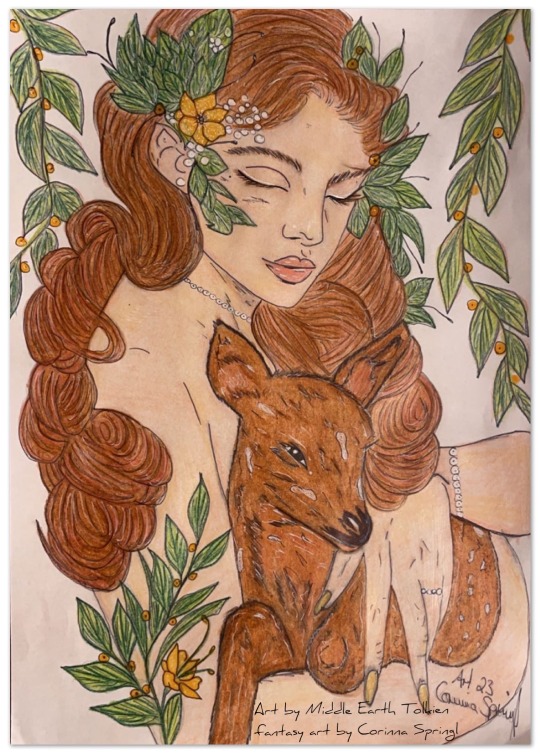

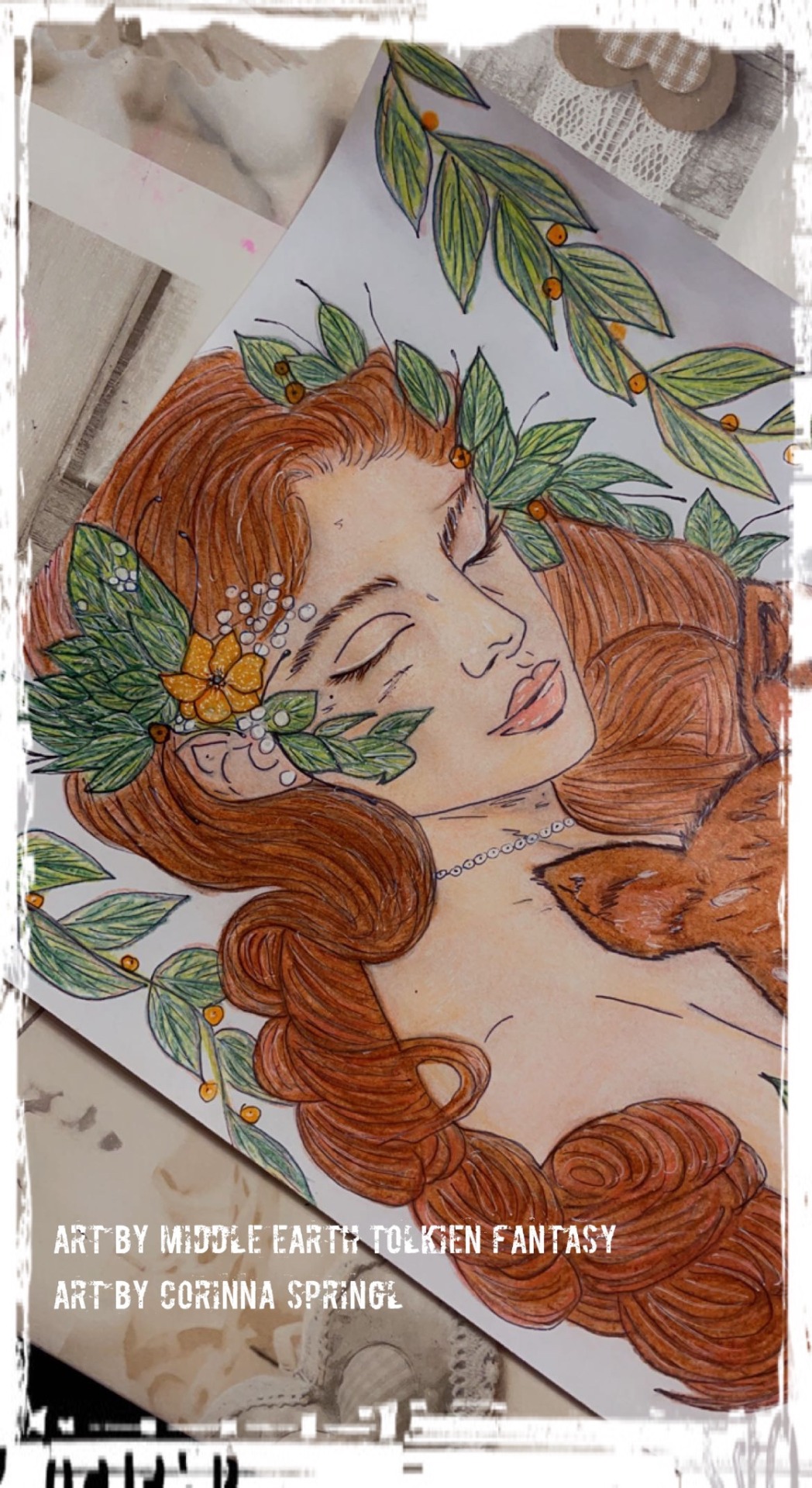
"...she also is lithe and fleetfooted. Deer she loves, and they follow her train whenever she goes in the wild; but she can outrun them, swift as an arrow with the wind in her hair. In dancing she delights, and she dances in Valimar on lawns of never-fading green."
― The Silmarillion, "Valaquenta: Of the Valar"
Nessa was the wife of Tulkas and sister of Oromë. In "due order," Nessa was the last named Valië.
🌿🌿🌿🌿🌿🌿🌿🌿🌿🌿🌿🌿🌿🌿🌿
Nessa was noted for her speed, swift as an arrow, and ability to outrun the deer who followed her in the wild. She was also renowned for her dancing ability, as she danced on the ever-green lawns of Valimar. She wed Tulkas upon the Isle of Almaren in the Year of the Lamps 3400.
🌿🌿🌿🌿🌿🌿🌿🌿🌿🌿🌿🌿🌿🌿🌿
Other versions of the legendarium
🌿🌿🌿🌿🌿🌿🌿🌿🌿🌿🌿🌿
In The Book of Lost Tales, Nessa was one of the Valarindi, daughter of Aulë and Yavanna. Her son with Tulkas was Telimektar.
Nessa was seen at the House of Tulkas bringing goblets of wine and drinks to his champions.
Nessa loved to retire to the green swards which her brother, Oromë, had cultivated from the richness of his forest.When creating the forests of Oromë, Yavanna had planted forest glades with spells so that the glades would always remain green and smooth, and Nessa along with her maidens would dance there as long as Laurelin was in bloom. She was even a better dancer than Vána.
3 notes
·
View notes
Note
The way you draw babies is so sweet! 🤗 can I ask for papa Manwë holding a little Eönwë?
Thank you!! And thank you for your patience to make up for the wait please have a Manwe and Varda with Babies x)


327 notes
·
View notes
Photo
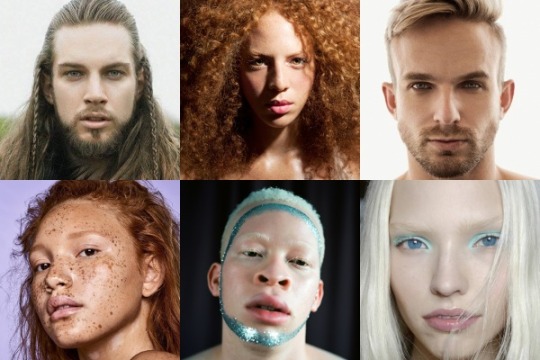
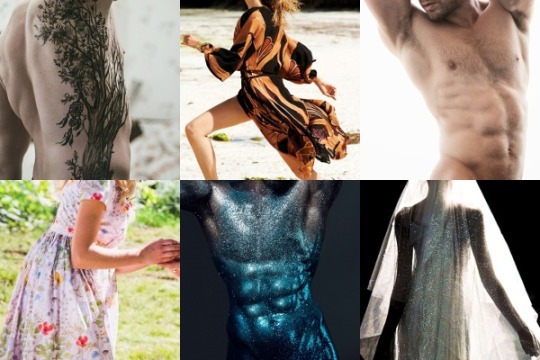
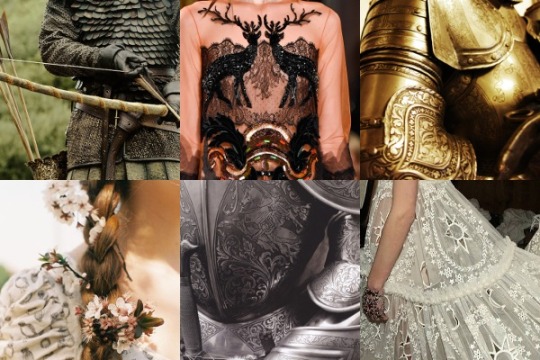
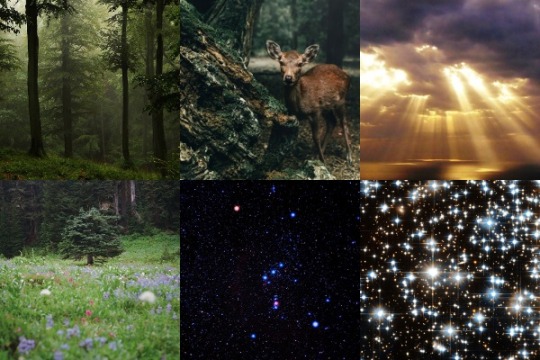
The Valarindi (The Children of the Valar)
In the earlier stages of Tolkien's writings, the Valar were less angelic and more like pagan (especially Greco-Roman) deities. One of the most notable features at this point was that some of the married couples among the Valar had children. The term for these beings was Valarindi, and it was used to refer to any child (or in a couple of cases, grandchild) of one of the Valar. This group of beings included:
Nessa, the Dancer, The Swift
Nessa was the daughter of Aulë and Yavanna, the sister of Oromë, and was associated with dancing, deer, and speed. Her wedding to the Vala Tulkas was the first and only marriage between two Valar to take place within Arda itself. The fact that she is strongly associated with deer and nature and that her brother is connected to hunting makes her vaguely reminiscent of the Greek goddess Artemis. Meanwhile, her connections to love, dancing, and beauty and her marriage to the warrior Vala Tulkas are comparable to Greek Aphrodite and Roman Venus. Nessa and Tulkas had a son named Telimektar in the earliest stages.
Oromë, The Huntsman of the Valar
Oromë was the son of Aulë and Yavanna, the brother of Nessa, and the Lord of the Forests and the Huntsman of the Valar. After the Valar retreated to the continent of Aman, Oromë would still occassionally return to Middle-earth to hunt the creatures of Melkor, and it was during one of these trips that he came upon the first elves. He was also strongly associated with horses and was especially loved by the people of Rohan, who believed that their horses were descended from ones he brought from the West. Oromë is like a mix of the Greek god Apollo with the many horse and forest gods of the different Celtic tribes, who the Romans often adopted as aspects of Apollo. Oromë was married to Vána, who was technically his aunt, and they had a daughter named Nieliqui; this relationship is very reminiscent of those of many Greek gods and goddesses.
Fionwë-Urion,
Fionwë-Urion was the son of Manwë and Varda, the brother of Erinti, and a warrior associated with light and fire. His connection to fire can be seen in his love for Arien, who at this point was called Urwen/Urwendi, with the names Urwen and Urion both coming from a rootword meaning fire or flame. At one point Tolkien developed a story where Melkor tried to claim Arien/Urwen as a wife, attacking her while she was guiding the Sun through the sky. She released herself from her body in an explosion of fire and "died", permanently scarring Melkor and causing the Sun to go out of control and burn parts of Arda, creating the deserts. It was said that Fionwë-Urion would kill Melkor/Morgoth in the last battle at the end of days due to his love for Arien/Urwen. This story was eventually dropped before The Silmarilion was published; Melkor fears Arien too much to attack her, while the Ainu who is in love with Arien is Tilion, the guide of the Moon. Fionwë-Urion eventually evolved into the Maia Eonwë, in the process also absorbing the character Nornorë, the Herald of the Valar, who became one of the "Lost Valar".
Erinti,
Erinti was the daughter of Manwë and Varda and the sister of Fionwë-Urion. At one point, she was written as the sister of Salmar/Noldorin and Ómar/Amillo instead of being the sister of Fionwë-Urion, though their parents aren't specified. At that stage, the three siblings were the only Ainur who left Aman to live with the elves of Tol Eressea. Erinti is associated with love, beauty, and music, which is fitting since Ómar and Salmar are both associated with music as well. She was eventually rewritten as Manwë and Varda's daughter, but despite this important parentage not much was said about her. Though the concept of the Valarindi was eventually dropped and the Valar became more like angels, Erinti survived as Ilmarë, the handmaiden of Varda. Together with Eonwë, who was once her brother Fionwë-Urion, she was a chief of the Maiar.
Nieliqui, The Little Maiden of the Valar
Nieliqui was the daughter of Oromë and Vána, and references to her as "the little maiden" suggest she may have been the youngest and most childlike of the Valar. Not much is said about Nieliqui besides the fact that she was a small maiden who liked to dance in her father’s woods. This often took place while Ómar-Amillo (a Lost Vala), who was the Vala of song and music, would sing in the woods. Both of Nieliqui’s parents had strong connections to nature, especially trees, and some fans have imagined her as a dryad-like character. Her love of dancing suggests that, she also takes after her aunt Nessa, the Vala of dancing. Nieliqui disappeared from Tolkien's writings once he abandoned the concept of the Valarindi and created the Maiar, and she doesn't appear in The Silmarilion.
Telimektar, The Warrior of the Sky
Telimektar was the son of Tulkas and Nessa, and a mighty warrior who fought hard in the struggles against Melkor/Morgoth. He is described as having a long sword kept at his waist by a silver girdle. His face and weapons are also described as heaving a silver gleam. In early writings, the constellation Orion (which contains many stars classified as blue giants) is Telimektar, with the star Nielluin/Helluin (Sirius) being described as his toe. He is in the sky as a guard against Morgoth, and he was given stars by Varda to mark his shape so the Valar would know he was there. He is also said to have diamonds on his sword’s sheath that will glow red when the last battle occurs at the end of the world. Telimektar was eventually dropped, but one of the many variations of his name, Telumehtar, appears as a name for the constellation Orion in the appendices of Lord of the Rings, and as the name of the 28th King of Gondor.
Once Tolkien dropped the concept of the Valarindi and created the angelic Maiar instead, the fates of these characters changed. Oromë and Nessa became Valar in their own right, Fionwë-Urion and Erinti morphed into Maiar, and Nieliqui and Telimektar were dropped. Even Melkor once was envisioned to have a son named Kalimbo/Kosomot with an ogress named Fluithuin or Ulbandi, but this character changed into Gothmog, Lord of the Balrogs.
#Ainur#Valar#Maiar#Valarindi#Oromë#Oromë Moodboard#Oromë Aesthetic#Orome#Orome Moodboard#Orome Aesthetic#Nessa#Nessa Moodboard#Nessa Aesthetic#Fionwë#Fionwë Moodboard#Fionwë Aesthetic#Fionwe#Fionwe Moodboard#Fionwe Aesthetic#Urion#Erinti#Erinti Moodboard#Erinti Aesthetic#Nieliqui#Nieliqui Moodboard#Nieliqui Aesthetic#Telimektar#Telimektar Moodboard#Telimektar Aesthetic#Ilmarë
71 notes
·
View notes
Text
Sav’s universe reminded me how neat the Lost Tales version of the Valar and their kids were.
Since Sauron was not developed yet as a character in Lost Tales, I’m now wondering about who Mairon’s relatives would be. If we stick with the pattern of a Vala’s most important Maia being their kid, then he’d be Aulë and Yavanna’s son? Oromë is already their son in Lost Tales though, its a bit weird to picture them as brothers. Especially if you make Saruman his brother too, like Sav’s universe.
3 notes
·
View notes
Text
Thoughts on werewolves and maiar and souls
So I was struck with many thoughts this morning that I had to share cause they’re distressing me. I started on the never-ending debate of how Sauron and Melkor created the werewolves (and tbh, dragons), Tolkien having described them as being imbued with evil spirits, which we can safely assume are maiar, probably lesser maiar.
Which of course, raised all sorts of strange questions about Tolkien’s idea of souls. Now - I have not read HoME, at least the majority of it, so I know that he’s teetered back and forth on this topic (esp concerning the orcs) but I am hoping that folks who are versed in HoME can provide some insight. Did Tolkien define souls as that which contained the Flame Imperishable? Where did he draw the line between being that had a conscious, intelligent soul, and those that did not? I always got the sense that birds and beasts and plants in his world did not have ‘souls’ per se - but that leaves us with the exception of Manwë’s eagles, perhaps Oromë’s cattle/horses/hounds too? Tolkien seemed to give some merit to beings that had language, those that could communicate of their own volition (unlike his early draft of Orcs, which were merely ‘beasts’ that ‘mimicked’ Melkor’s words). The Eagles could speak languages recognizable to us, but then you have the ravens, the thrushes, many tongues of bird or beast that the wise and learned could come to be fluent in. In that sense, of course animals all have their own languages, as is true in nature - but did Tolkien ‘count’ these as evidence of souls? Did all living things possess some tiny part of the Flame Imperishable, as it made up the heart of the Earth itself? Were all souls immortal, in that once the body died, the souls continued on another journey? WHAT DID ERU DECIDE TO GIVE THE FLAME TO? EVERY LIVING THING? Because, as I recall, in the case of the dwarves, they would not be ‘true’ people until Eru blessed them and gave them a bit of the Flame, otherwise they’d be just animals. And then where did the souls of dead creatures of nature go? Tolkien I need to know these things.
But to return to the werewolves - these abominations of nature which seemed to be, from Tolkien’s wording, beasts that were then possessed by maiar and given consciousness and intelligence beyond their natural capabilities (i.e., they can speak - the rest, their power, size, arguable to have just being bred selectively or tweaking of DNA by Melkor himself). But how do you just, stuff a maia into the body of a living creature? It raises so many questions, which brought me back to: do animals have souls? If they do not - that suggests maiar could inhabit the bodies of any animal, and that ‘evil’ beasts encountered in Middle-Earth could be possessed by maiar and be a reversible condition. But this seems futile, as maiar could already change their own fanar into anything of their choice. So... ok, let’s explore if they did have souls. A few options. Maiar spirits are more powerful than those of lesser beasts or even elves or Men. Could they ‘contest’ with the soul already inhabiting a body, and if they gain the mastery of the hröa, could they effectively eject the owner’s soul out of it? Could they coexist (I have a feeling Tolkien would have said ‘no’ on this, only one soul could inhabit a body at a time)? The other option would be to release the soul from the body before putting the maia in - either perhaps this could be performed through magic, or.. well, you could kill the beast, and in effect perform necromancy to resurrect it by having the maia possess the corpse and give it new life (ZOMBIE DOGGOS, except not really, except, wouldn’t that look awesome).
But then, my next question of: How did they breed? I’ve pondered on Ainur reproduction a LOT, but if we just wanna stick to what we know, it seems highly unlikely that they could make new maiar by breeding the werewolves with each other while possessed by the maiar. It sounds like each new werewolf began from a beast and was at some point in its life given a maia host. While we do not really know how long these wolves live, it seems that they had a lifespan far beyond that of a normal animal, and if possessed by a maia, one could assume they are immortal. For, the body (fana) of a maia is not special, just flesh or whatever material they choose, but it is the ëala, the soul, which powers it and gives it the abilities of that maia - they bleed through, they extend, from the soul into the body. So while the werewolves are not homemade fanar, I would think they exhibit the same immortal nature of a regular maia. This by extension makes me think that the wolves were possessed when they became mature, because, as a norm, maia bodies do not age. So - back to the question - I am perplexed at how Mairon went about breeding these animals. Tolkien cites Drauglin as being the father of many many werewolves, which really does suggest to me that they reproduced while possessed. This... er... this really starts getting complicated with what magic DNA gets passed on when Ainur copulate with non-magic creatures, and Tolkien did not do a great job of stating definitively what wiggly things go on there (this is the basis of my philosophical metaphysical musings of the past two years. Conclusion: Ainur cannot breed new, pure, Ainur while in tangible raiment, very very long story short, but there’s no completely plot-hole free answer). So I just, have to think that while maiar-possessed werewolves did breed, their offspring were genetically based on the physical form of the parents. The soul inside... UM... TOLKIEN HELP ME OUT... this, once more, suggests that beasts were considered soulless. They just... can’t inherit a new maia soul... perhaps their bodies were enhanced with a smidge of inherited magic but THE SOUL CAN’T BE AINU IDK WHAT TO TELL YOU gdi Tolkien. If Mairon and Melkor were over here making new Ainur we’d have heard about it - Chekov’s gun, ok? The idea of Valarindi was scrapped, Tolkien was pretty clear Ainur weren’t - can’t, won’t, both - having kids. The best I can say is that it’s implied each werewolf was independently imbued with its own maia spirit. Help me out here. I want feedback and ideas. Again, it seems sort of dumb to go through all this work when you could just have the maiar themselves turn into wolves to begin with, but. Hey, I’m just going by the Silm. Apparently it happened. Perhaps it was less energy-costly for maiar who did not have bodies to possess one rather than take the time and energy to make their own.
But my final piece of all of this was this: Given everything above, what is there to say that maiar could not possess dead bodies? Maiar are free-living spirits. A body is a vessel without a soul. I’m not saying zombies, but.
Zombies.
#lord of the rings#the silmarillion#sauron#maiar#ainur#my meta#SERIOUSLY TALK WITH ME HELP ME OUT#i know i've seen werewolf meta on here before but i cant remember what yall said#if this is too long and bothering you just hmu and i'll put it under a read more or smth#oh shower thoughts
66 notes
·
View notes
Note
Do you have any thoughts or headcanons concerning our dear forgotten Langon?
Ahhhh... I too had forgotten Langon!
Canon-wise, I don’t think we have much to go by... We get that Langon is derived from throat. Not mouth, which I find extremely interesting... Because in LOTR, we get the Mouth of Sauron. I think this distinction is really important.We also get from the Parma Eldalamberon xi that Langon in Gnomish (and since he’s all extremely early stuff when it was primarily Gnomish-based names) means “great bell” and is generally related to bell-related imagery.This is where the headcanon stuff pops in!On Tolkien Gateway, it lists him as a Vala, but I think that’s a misconception (I may be wrong, but I don’t have access to the Lost Tales atm), and I think refers more to the Valarindi, and therefore I see him as a Maia (although I have some other theories to this).I don’t really do a lot of “visual” headcanons. I’m not sure if I have any physical concepts of how he looks at all. As for function, my HC is based primarily on that he’s not the mouth. Which is to say, he doesn’t choose the words spoken. This ties in a lot with the Mouth of Sauron, where I think he acts as a simple diplomat. He chooses his own words, but tries to remain true, so to speak, with the desires of his master. A bit ironic, perhaps, in that this means that the Mouth of Sauron has a lot of freedom to how he speaks...I don’t think Langon has that freedom. This isn’t to really say he has no mental freedom or bodily freedom. More that... When it is time for Melkor to relay a message outward, Langon provides the physical “form” to speak, like a flesh and blood megaphone, and his words are literally Melkor’s.In the book series I just finished, there are Prophets, and when they speak, they sort of go “blank” -- they speak what must be spoken, and return to “normal” and that’s the end of that. If anyone is around, the prophecy is heard. If no one is around, it is not heard.I think of Langon as very similar. He willingly -- as a servant of Melkor -- allows his throat to be used. He provides the function of vocal chords, but it is Melkor who forms the words.I do, however, wonder if he needs to be one of the Ainur. Something I sort of love about Melkor’s forces is the extreme... Ambiguity of what they are (Maiar? His own creations? Tortured creations of others?). So I wonder, too, if Langon is a title. Those who are gifted or willing or granted the ability to be the throat/bell of Melkor. This steps a little more into my... Melkorish/heretical headcanons/AU, as I do believe that some worshiped the Maiar as well as the Valar. So the original Langon may have served as his throat, but non-Ainur servants could be gifted/willingly give their service as a Throat. Sort of like a social task? Which could have eventually been distorted into being a Mouth (or a Mouth was always a secondary task/role in society? Both are useful roles...).
#nwn talks#tolkien#langon#radioactive-earthshine#I weirdly love langon#but I love all his servants#and melkor#i have a problem....
22 notes
·
View notes
Text
In this one Annals of Aman version: --Uinen and Ossë are Valar --Estë is not; she is the leader of Maiar --Niënna is sister to Manwë and Melkor --the Maiar are Valarindi, but also Maiar were originally Valimor, then Mairi -- which lead to the word Maiar I have been struggling with how I should design the original term for Maiar in my own Valarin version. One type was Mayanūz, but I hated that and it seemed highly incorrect. I was thinking of altered versions of Maiar directly. There's no context to what Valimor nor Mairi came from--Maiar is Quenya, but the other two were proto-terms. Yet, I may use one of those for my fic.
2 notes
·
View notes
Note
What are your thoughts on Aluin? From the lost Valar? What do you think he’s like? Or looks like? Really curious to hear any thoughts/opinions you have on him!
Also, I hope you’re having an amazing day! I look forward to seeing each notification I get for your blog❤️
Hey anon! First of all thanks so much for your ask, I've unfortunately been struggling recently due to more shit happening irl, but messages like these truly brighten my day and I'm just... in awe that the absolute chaotic madness I'm causing here is enjoyable to others out there too. My day is amazing now thanks to you and I hope yours is too❤️
Anyway - Aluin! I've actually been thinking about him from time to time (haha) over the last few years. He's a bit of an interesting and also odd case to me because:
He may be the one Vala we know by name who didn't descend into Arda (at least some sources claim that)
He had sons but no (known) spouse, unlike the other Valar and their associated Valarindi (who were still a thing at that point)
He was supposed to be the eldest of the Ainur, which I assume would otherwise/in the "newer lore" be Melkor due to the whole medieval cliché that the eldest son is usually the strongest/greatest/most powerful (my explanation for that is always slightly terrible, but I think you get what I mean)
What does Aluin look like? Well, I have no idea - because my headcanon, if I were to incorporate him into canonverse as I usually write it, is that he never appeared in Arda like the other Valar did.
Let me explain (the following will all be headcanons, thoughts and the usual wild ideas).
So if you happen to be into space content, particularly astrophysics and the like, you may have heard that time is often being regarded as a fourth, temporal dimension in addition to the three spatial dimensions we're familiar with. Taking this idea, I'd basically have Aluin be by himself in the fourth dimension, where he isn't really able to be perceived or interacted with by the inhabitants of Arda, possibly including most Ainur.
Character-wise, as well as functionally, Aluin would be very similar to Námo. Being The Judge, Námo is a passive observer, as seen in the Silmarillion: He doesn't attempt to direct people, he waits for them to make their choices and then judges them. Prophecies and random throwaway comments are rare. He's often silent and seems aloof.
Time, as Eru would certainly be aware, is a causality-breaking and timeline-ruining power, so he would make sure Aluin is even more removed from everything than Námo is, which he would be in his dimension. I also think that Aluin, as the one person not stuck on the linear arrow of time, would be the least concerned about whatever divine drama is currently unfolding, possibly not always have the chain of causality in order and seem aloof and impersonal if anyone somehow managed to encounter him. He would have an even greater knowledge of the past and possibly the future than other Valar, though I would say maybe not on the level of Varda's sharp insight and Námo's prophecies, and overall function as a Guardian of Time of sorts, making sure it flows and nobody messes with it too much (I wonder what he thinks about black holes).
I could also picture Aluin (either alternatively or additionally) as a whimsical being who regards the fate of Arda as a neat little tale among many. He might appear either very young or very old depending on the circumstances, which would be a fun contrast and irony compared to the other Ainur's (relative) agelessness.
Additionally, I would be tempted to incorporate some ideas and symbols from the Legend of Zelda, as it also has time travel and magic music which would fit really well with a Time Ainu (Time-nu hehe).
If I had to incorporate Fanuin, Ranuin and Danuin as well, I'd choose one of the following:
They're Maiar of his (same change as the other Valarindi)
They're aspects of Aluin
Corresponding with 2.: They're creations of his similar to Aulë's Dwarves before Eru adopted them/Melkor's dragons
Either way, they would act as his helpers by focusing on their respective time measurements.
(Small side tangent if I may: Bringing Aluin back into the universe, even if he remains remote and removed, comes with the issue that Melkor, due to his share in everyone's gifts, basically automatically gains time powers as well, which... could be a problem. However, as we see with water, Melkor doesn't necessarily excel in all areas even if he theoretically has access to them, so his time powers could be something fairly minute (pun intended), for example like the recall ability in Zelda TotK. Also you could argue that his introduction of decay and making Elves fade is already the extent of whatever temporal powers he may have. Just something to keep in mind for worldbuilding ^^)
So yeah, those are my thoughts, ideas and possible headcanons for Aluin so far. Maybe something to expand on in the future or feature in fic? We'll see. Either way thanks again for your ask and I hope this was at least... mildly interesting😂💕
#aluin staying with eru would also be funny because well#those are the TIMELESS halls#would be ironic wouldn't it#aluin#valar#ainur#headcanons#my headcanons#worldbuilding#cílil answers#also sorry for the random zelda references haha
1 note
·
View note
Text

Baby Mairon and Papa Aule ❤️
#my art#tolkien#lotr#silmarillion#mairon#Aule#back in the before#Aule has always been my fav Vala#he’s got such great dad energy#also everyone who’s sent me tags and messages imma get to them I.#I’m finally free of school#for a week at least#valarindi#maiar babies
317 notes
·
View notes
Text
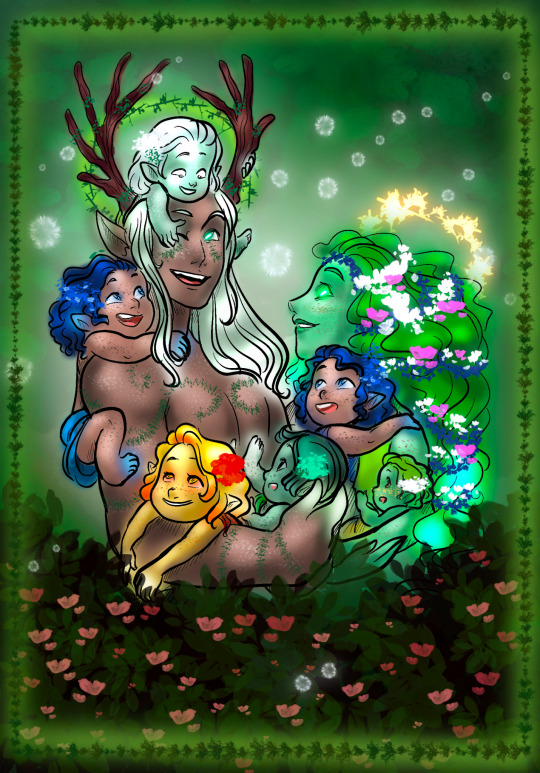
Today’s family is the Maiar of Orome and Vana, clockwise from the top (of Orome’s head) we have Tilion, Pallando (who I’m head canoning as female), Nieliqui (their cut daughter), Fankil (the og Lt. of Morgoth who I’ve headcanoned as originally being a maiar of Orome, corrupted for his skills in the hunt), Arien, and Alatar .
#my art#tolkien#silmarillion#lotr#valarindi#valar#maiar#orome#Vana#blue wizards#alatar and pallando#arien#nieliqui#fankil#Tilion#maiar babies
258 notes
·
View notes
Text

Tada! Continuing the Maiar babies we have Yavanna with toddler Melian and baby Aiwendil (I know Melian technically works for Vana and Este but it says she’s kin of Yavanna so she’s her daughter in my heart)
#my art#tolkien#silmarillion#lotr#Yavanna#Melian#aiwendil#radagast#maiar#valar#Valarindi#I’m tempted to do this with the rest of the Valar with my OCs and headcanons for which named maiar go with them#maiar babies
229 notes
·
View notes
Text
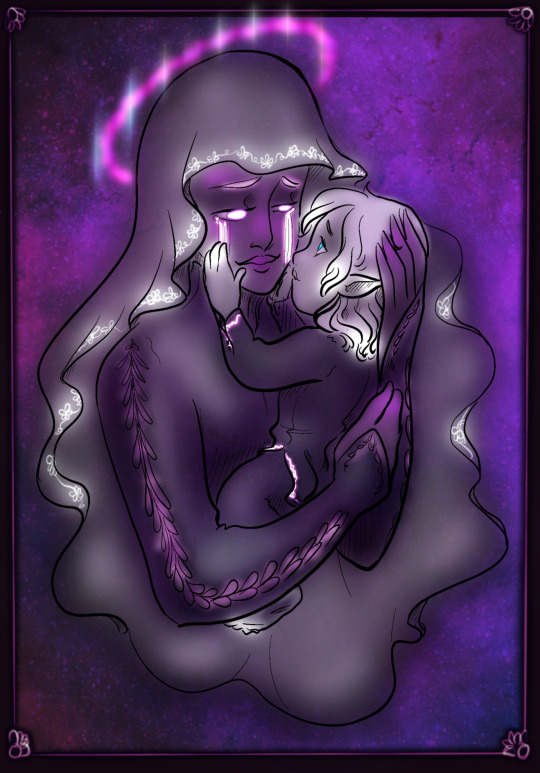
Today’s Maiar babies is Olorin and Nienna (he’s another one that technically works for someone else, Irmo, but I love that bit about him learning compassion from Nienna, and that such a big part of Gandalf so yeah, she’s his mom now)
223 notes
·
View notes
Text
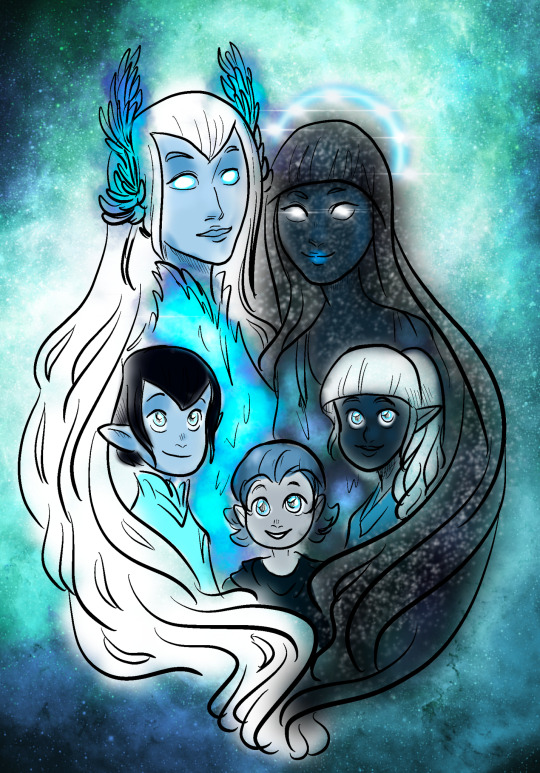
Little thing of Star-Bird family. Manwe, Varda, Eonwe and Ilmare, and in the middle another deleted character I’ve decided to put back in, Nornore. He was the original herald of the Valar, who I’ve put back in as a younger brother/aide to Eonwe.
#my art#tolkien#lotr#silmarillion#Manwe#Varda#manwe sulimo#varda elentari#eonwe#ilmarë#ilmare#nornore#valarindi#maiar babies
235 notes
·
View notes